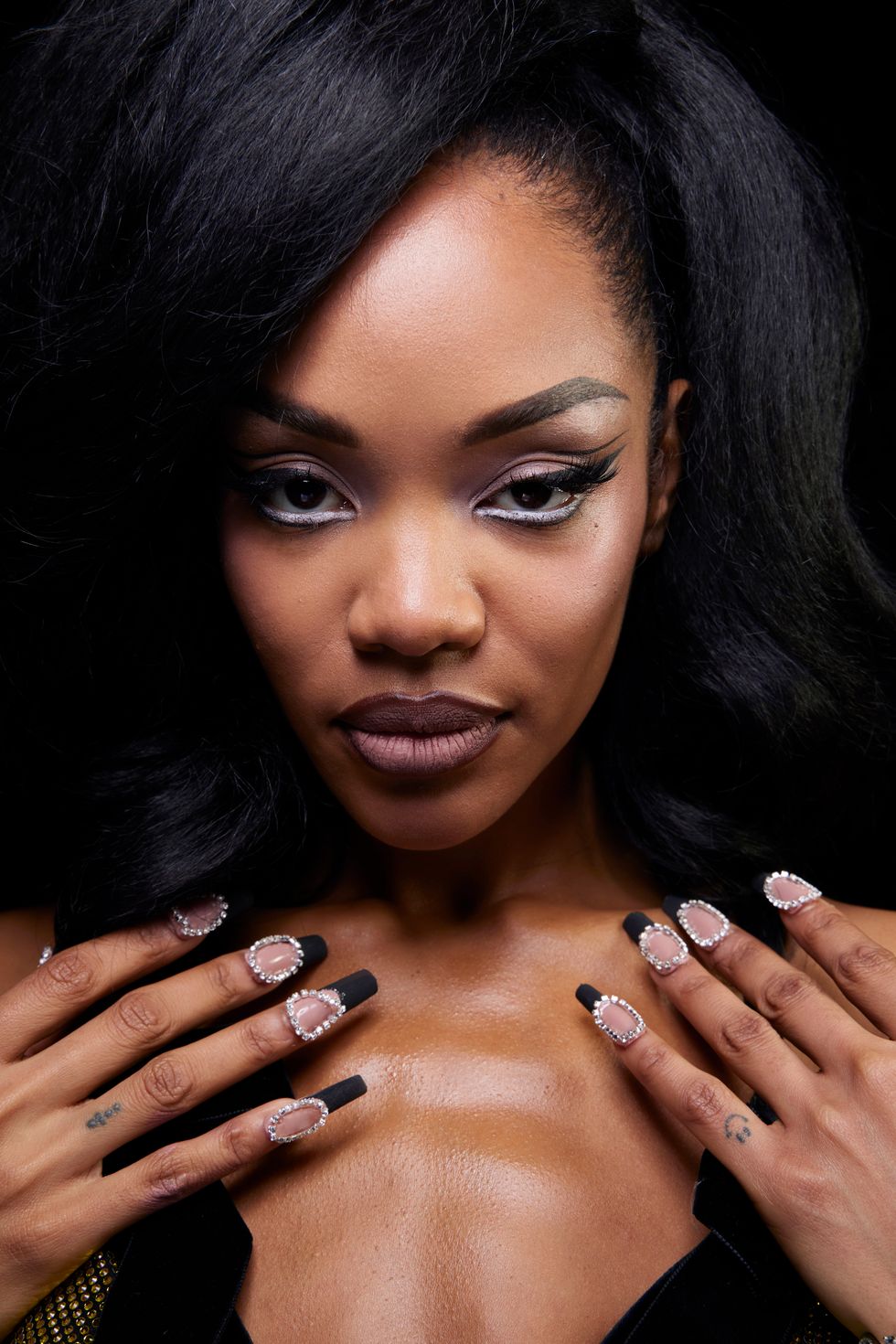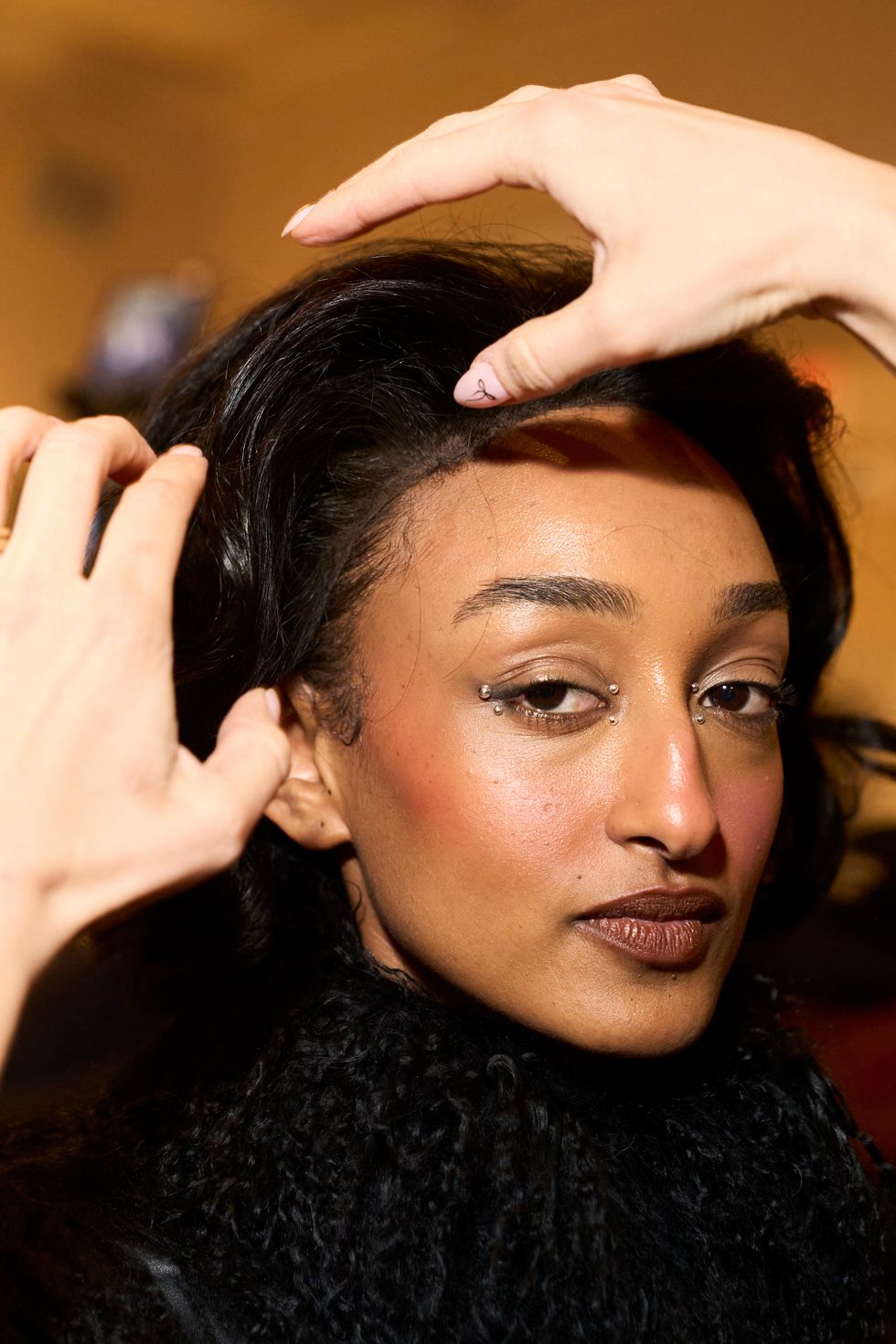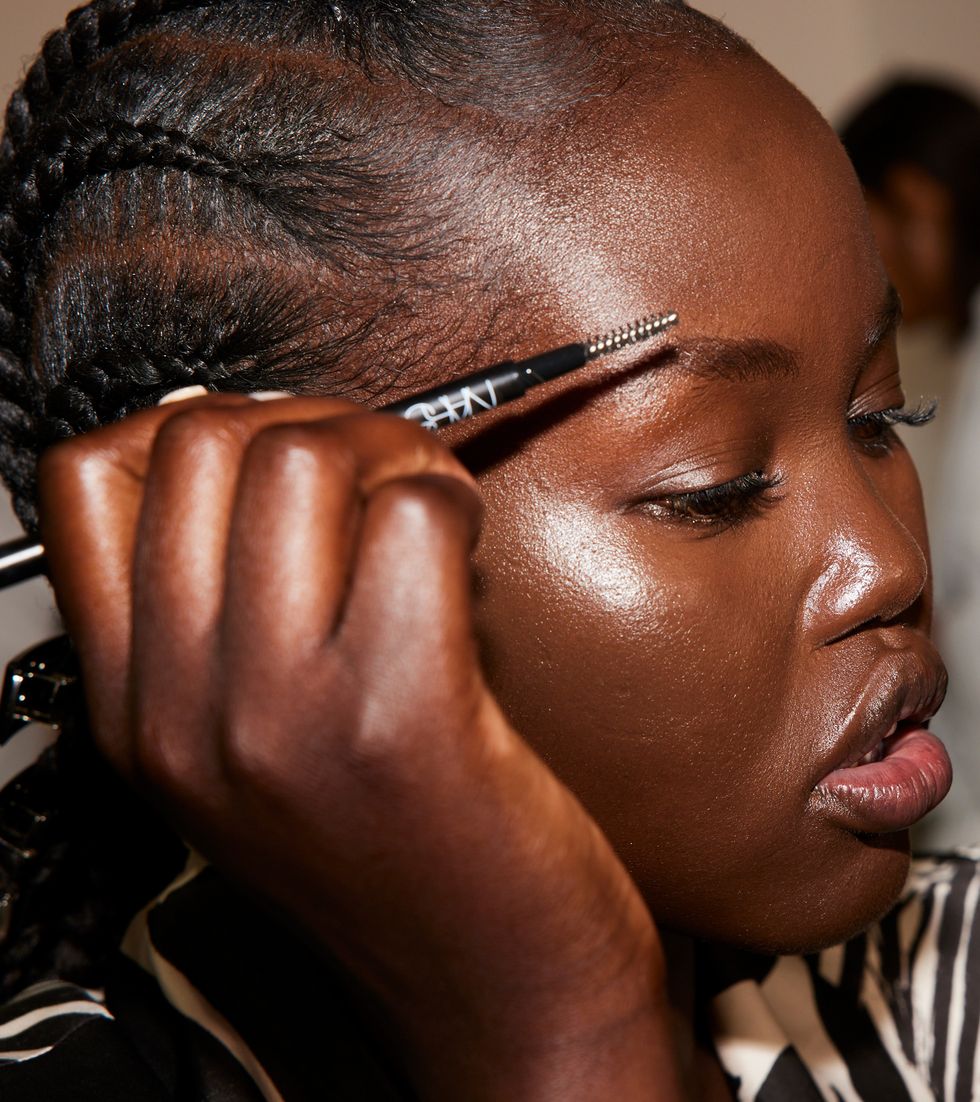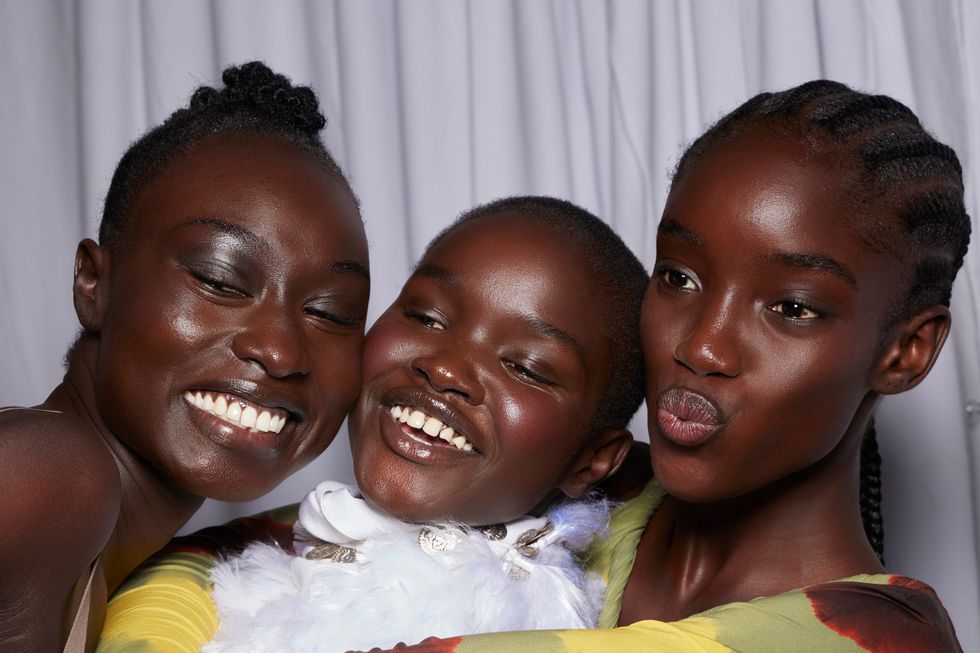“It’s actually quite stressful to constantly be thinking about the way you look instead of using that time to prepare for an interview,” 26-year-old Sirayah Shiraz from London tells me on the phone before heading to a press conference. Shiraz has worked in sports journalism for over five years but has been in front of the camera for just two. She’s a freelance presenter who works with Chelsea and the Premier League in the United Kingdom. Although Shiraz wants to be taken seriously as a sports journalist, she spends considerable time thinking about her appearance. “How I look and voice what I want to say impacts how people receive it. I’m in a predominantly male industry, so I’m usually the only woman in the room and nine times out of ten, I’m the only Black person, too.”
The layers of her minority status have led Shiraz and other Black women to question Black beauty. Black women aren’t a monolith; we have different features, hair types, and skin tones.
If you don’t fit the idealistic standards of Western beauty, you can often feel like your average self is not good enough. This leads many to chase unrealistic ideas of what is considered conventionally attractive. For some Black women, this means constantly being dressed up to the nines. Your hair is always laid, you have lace front wigs on rotation, and you’d never be caught dead without your nails or lashes on.
According to NIQ, in 2023, Black Americans spent $8 billion on beauty and Black cosmetics—a 10 percent increase compared to the total market’s 9 percent growth. Over in the UK, the British Beauty Council, a non-profit that aims to solve challenges within the beauty industry, found that Afro-Caribbean women spend six times more than other ethnicities on beauty and hair services. Indulging in beauty is an act of self-care and at its core is harmless. But, it seems that some Black women feel pressured to constantly look hyperfeminine. So it begs to ask the question: Why aren’t Black women allowed to be plain?
27-year-old Abbi October*, an influencer marketing manager from London, has seen firsthand that being a Black woman means putting in more effort with your appearance than your white peers. October says, “The white girls in my office can come into work bare-faced with messy buns, t-shirts, and jeans, which is completely fine.” She continues: “But when I do this, I’m viewed as being underdressed. I’ve had jobs where some people even questioned my role and assumed I was an intern when I was actually the manager.”
October’s fears are valid. The Crown Act was created and passed by the House of Representatives in 2022 to help end hair discrimination and give people the freedom to wear their hair in braids, bantu knots, locs, and other styles. This act, now passed in 23 states, is necessary, as Dove and the CROWN Coalition discovered that Black women’s hair is two and a half times more likely to be perceived as unprofessional. So, it’s unsurprising that Black women spend so much time worrying about their appearance.
October has since left her job to freelance and hopes to get into content creation full-time. Though she previously created content, October confessed that she had anxieties about being an influencer as she worries about how she would present on screen—like many young adults today. A study conducted by the University of Ottawa in 2023 found that those who are exposed to several images on social media of celebrities and fashion or fitness models can lead to the internalization of unattainable beauty standards and a greater dissatisfaction with body weight and shape.
“I started to panic and think about what I would look like. Would I need to buy a new wig? Do I need to get my hair done?” October would ask herself. In terms of beauty aesthetics, October describes herself as a ‘floater’ and explains that she doesn’t have one definite look. However, she believes that Black women are boxed into fitting one type of aesthetic. “If you’re a Black girl that doesn’t wear make-up or dresses plainly, people think you’re being a pick-me, or that the reason you choose to look that way is because you want to make a statement. But in reality, it’s just how some Black women choose to look,” she says.
23-year-old Amber Meekins, a college student in New Carolina, thinks the world expects Black women to do it all. “We’re expected to put on a show and dress in a specific way and if we don’t, we’re considered lame or out of the loop,” Meekins says. She recalls a time in her life when she couldn’t leave the house without wearing makeup due to the expectations people put on her. Now that she’s a college student, Meekins admits to struggling with her self-esteem because she feels the pressure to fit into the mold of nice wigs and clothes.
She recalls her first few months of college: “Suddenly, the way I saw myself changed. I started to find my style unattractive and stopped wanting to explore who I was. [I] tried to be everyone that was seen as better,” she says. Meekins believes that these beauty standards are associated with how men see women. “There are so many songs where men speak about wanting a woman who always has her nails and hair done. Women have internalized these standards and shame other women who aren’t always so put together,” she adds.
October believes that Black women often struggle to get taken seriously unless they’re fully glammed up. Shiraz experiences this pressure at work and says it’s part of the reason why she tries to look her best, as Black women are so underrepresented in sports journalism. “A lot of the time when you’re a Black woman in any industry that deals with the public, you’re more likely to be ridiculed,” Shiraz says. “When I go on TV, I want to look presentable so it doesn’t give people the opportunity to pick apart what I’m saying,” she adds.
While Shiraz enjoys looking like a ‘baddie’, when she goes to work, she can’t help but see the contrast between the way she looks compared to some of her white colleagues. “They’re obviously all naturally beautiful, but there’s less of a focus on how they look. When I go to sports events and look at how some of my white colleagues look, I think, Wow, I wish I could look like that sometimes,” says Shiraz.
This expectation for Black women to conform to these beauty standards extends to Black women who are queer. Jessica Dunes* is a 26-year-old Black queer woman from New York. She believes that some Black queer women conform to hyperfeminity due to society being cisheteronormative and systemically oppressive for LGTBQAI+ women. “Queer, masc women exist on the opposite end to the femininity that society ascribes to womanhood,” Dunes explains. “Furthermore, masc presentation in women is an overt expression of queerness, which opens them up to homophobic—and likely transphobic— violence.”
Dunes believes that there’s an element of safety for queer women to conform to these beauty standards. ”Deviation from norms and overt expressions of queerness are punished in our society, as evidenced by anti-LGBT hate crimes,” Dunes adds. On top of this, Dunes says that some queer masc women face material effects of deviation from the beauty standards. “I think there’s a dehumanization, [particularly a] lack of safety and care that comes with looking masc.” When cis men try to physically fight masc women, Dunes believes it’s stripping the women of their femininity and humanity. She also touches on the aspect of “beauty” being social capital and how that can dictate the way society treats queer women. Dunes says, “Transitioning from presenting feminine to masculine could change the way you’re accepted within all social groups you’ll be around.”
Dunes doesn’t feel pressured to conform to the beauty standards within the Black community. However, she admits that when she was closeted and surrounded by mostly heterosexual people, she was a lot more aware of what heterosexual beauty standards were and felt the pressure to conform. “On the other hand, now being surrounded by 99% queer people and being quite confident in my queerness, I am only aware of hetero beauty standards because of Twitter,” she says.
Social media plays a huge role in how all women see themselves. A 2018 study by the University of South Wales highlighted that people who spend over an hour a day on Facebook, Instagram, and Pinterest are more unhappy with their appearance than those who spend less time online. Across every race and ethnicity, there is one standard look that remains dominant on social media. For Black women, it’s the Instagram baddie. This woman usually has a 30 inch buss down, acrylic nails, lash extensions, and is typically thin or “slim-thick.” If the majority of influencers you follow all look the same, it’s only natural to want to emulate that look. While the Internet has created community, it lacks in illustrating that Black women can just be—as they scroll on their phones, what’s representative on the screen isn’t the same as their bathroom mirror.
Emily Mendez, a private practice psychotherapist and wellness expert, shares that she has seen firsthand how European beauty ideals can leave psychological wounds for Black women. Black women are profoundly impacted by Eurocentric beauty standards that equate their worth with lighter skin tones, looser curls, and more delicate facial features. Mendez thinks it’s important for Black women to “define and embrace beauty on their terms—never through societal smoke and mirrors that privilege one ideal while dismissing so many others worthy of positive affirmation.”
However, she acknowledges how difficult it can be for Black women to learn that they are good enough. “Letting go requires diligent self-work, countering internalized prejudice with conscious rewiring of self-talk, radical self-acceptance, and surrounding oneself with affirming messages,” she says. Black women should be kinder to themselves and each other. We know that our appearance unjustly informs how people treat us. Unrealistic beauty standards should not hold Black women down. We are enough. Sometimes we want to slay a frontal and other times we don’t. We might want to get our lashes done; in other instances, we might just want to wear mascara and lip gloss. The daily experience of being a Black woman can be exhausting enough without the additional pressure of thinking about what we should look like.
*The names Abbi October and Jessica Dunes have been changed for privacy purposes.




